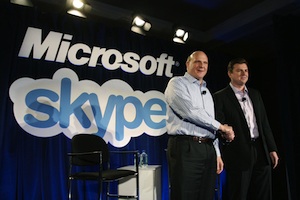Ballmer Details Skype Acquisition
- By Jeffrey Schwartz
- 05/12/11

Microsoft CEO Steve Ballmer and Skype CEO Tony Bates at the San Francisco announcement of Microsoft's acquisition of Skype. Source: Microsoft. |
At a press conference in San Francisco this week, Microsoft CEO Steve Ballmer described the company's pending $8.5 billion acquisition of Skype as a major milestone in its efforts to extend cross-platform communications across mobile devices and PCs.
Executives of both Microsoft and Skype appeared at the press conference to discuss the deal.
"This is a big day for Skype; it's a big day for Microsoft," Ballmer said. "We're adding a new division and a new promise to our customers, the promise of universal next-generation communications."
That new division will be headed by Tony Bates, now Skype's CEO, who will be president of the new Skype division. Bates said he anticipates Skype's user base growing from millions to billions of subscribers. "We believe that this is a platform and a set of services that can reach everyone on the planet," Bates said.
Ballmer talked up Skype's huge installed base of 170 million users and the fact that, on average, 30 million people are online at any given time. He said 600,000 new users sign up every day. While the discussion was short on specifics regarding integration with existing Microsoft technologies, he indicated the potential to extend Skype across Outlook, Xbox, Kinect, Messenger, Hotmail, and Lync.
Ballmer emphasized that Microsoft will continue along Skype's path of supporting multiple platforms, including Apple's iOS and Google's Android. "I said it and I mean it, we will continue to support other non-Microsoft platforms," he said.
About the Author
Jeffrey Schwartz is executive editor, features, for Redmond Developer News. You can contact him at [email protected].